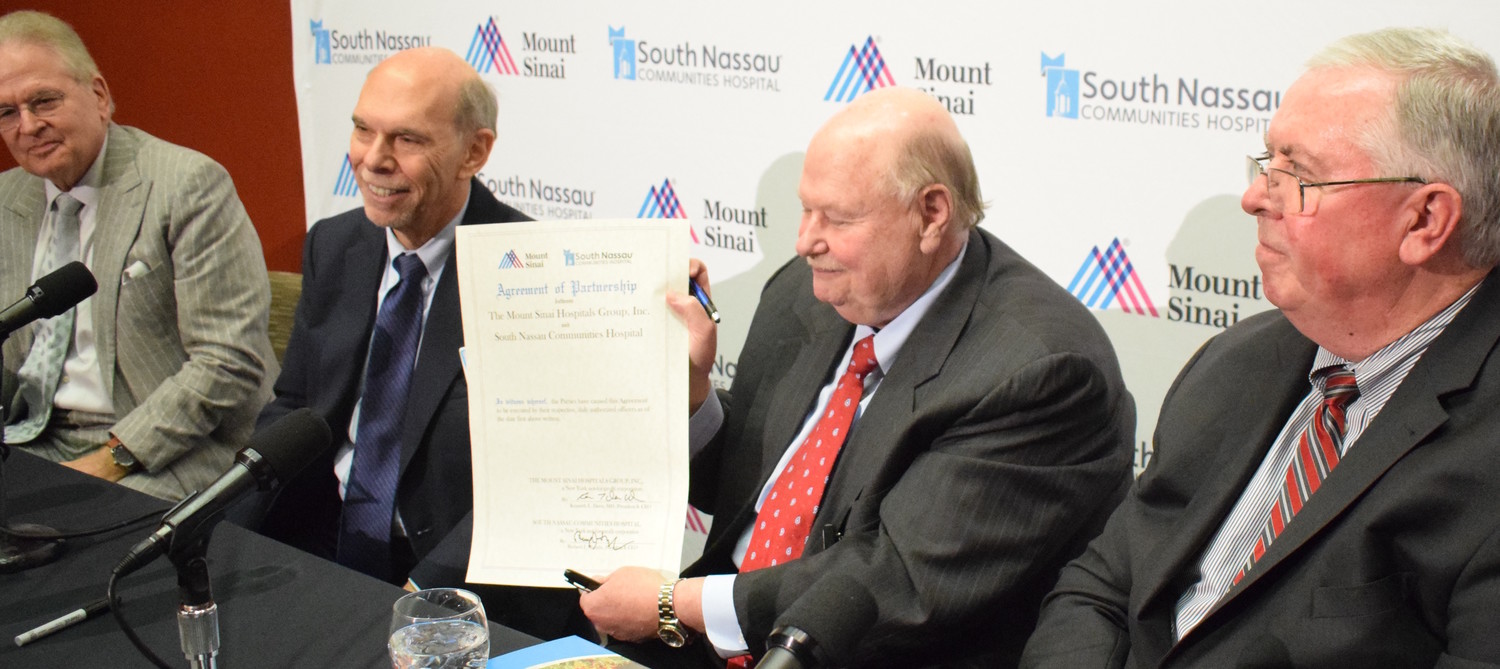South Nassau and Mount Sinai join forces
Representatives of South Nassau Communities Hospital and the Mount Sinai Health System announced the finalization of their partnership at a news conference at South Nassau on Tuesday. The affiliation will make South Nassau the Long Island flagship hospital in the Mount Sinai network, which is based in Manhattan.
The move was designed to bring advanced health care to the South Shore by making South Nassau a part of one of the largest academic health systems in the nation. The two health care providers have set a five-year timeline, after which Mount Sinai is expected to take over South Nassau fully.
“This is an exciting day for the hospital,” said South Nassau President and CEO Richard Murphy. “We kind of took our vision for the future and we tried to see who might we match that up with, and who might share our vision for the kind of service we want to see delivered to the communities here on Long island, and after a very extensive discussion ... the choice of Mount Sinai Health System was far and away the choice that we all made.”
At the news conference, Murphy sat with South Nassau board of directors Chairman Joe Fennessy, SNCH Vice President and CEO Adhi Sharma, Mount Sinai CEO Dr. Kenneth Davis and Mount Sinai President Dr. Arthur Klein. With the agreement, South Nassau became the eighth hospital in Mount Sinai’s $8 billion network, which includes seven facilities in the New York metropolitan area, staffed by 6,500 physicians, and the Icahn School of Medicine, a world-renowned center for medical research and development.
The agreement is the culmination of more than a year of research. South Nassau administrators met with a half-dozen hospitals and analyzed data after an extensive request- for-proposals process to identify potential medical institutions with which to affiliate. The board of directors unanimously voted to partner with Mount Sinai, and announced its decision in January, after signing a letter of intent in May 2017. Over the past 10 months, the two institutions have worked together on the transition, as the state Department of Health, Education Department and attorney general approved the partnership.
“We need to change in order to meet the times,” Fennessy said. “The day of doing a lot of routine procedures in a community hospital has passed us. If we’re going to serve the community, we really have to be something different, and we had to look toward providing more tertiary services.” Tertiary care is health care in a large hospital after a referral from a primary or secondary physician.
Mount Sinai provides 40 percent of the institutional health care for residents of Manhattan and is the city’s largest private employer, according to Klein. South Nassau serves about 900,000 residents across the South Shore, and employs roughly 3,500 staff members and 900 physicians. It also offers comprehensive cancer care, interventional cardiology, orthopedics and intensive care, and is the only trauma center in southern Nassau County.
After the merger, South Nassau’s board of directors will direct the day-to-day operations of the Oceanside campus. There will be cross-representation on the South Nassau and Mount Sinai boards, and Fennessy will serve on the Mount Sinai executive committee. The need for South Nassau’s board may be re-evaluated in five years, according to board Vice Chairman Tony Cancellieri. He added that clinical integration has taken place, as doctors from South Nassau have begun working with physicians from Mount Sinai.
“Our whole goal is that residents of the South Shore of Long Island will no longer have to travel into Manhattan for sophisticated clinical procedures that have normally been done at Mount Sinai or other hospitals in the city,” Cancellieri said on Monday, ahead of the news conference, “but they could be done on our campus in Oceanside with doctors coming from Mount Sinai to Oceanside.”
Klein said he did not envision the staff being downsized. He added that a name change was likely for the hospital, which would reflect South Nassau being a part of the Mount Sinai system, while also preserving the legacy that South Nassau has in the community. The name change is still in the planning phase.
According to Klein, many new programs and services will be provided at South Nassau, but they must be approved by the state Department of Health. The long-term plan is to include open-heart surgery, pre- and post-liver transplant services, gastroenterology services and an expanded ambulatory network. Among the other advancements patients could see come to the South Shore are new heart valve replacement techniques, the latest in cancer and pediatric treatment, and cutting-edge neurosurgery and robotics technology. Klein said that patients receive exceptional care at Mount Sinai because of its vast research and academic presence, which account for its ranking as one of the best networks in the nation.
As part of the agreement, Mount Sinai will provide $120 million to help expand South Nassau’s campus and services, which includes plans for a new, four-story southwest addition in Oceanside with an expanded Emergency Department, intensive-care beds and surgical suites. The expansion is part of a $400 million capital program, which is set to add enhancements at South Nassau including a three-story parking structure and a new central utility plant and electrical emergency facility on the hospital’s main campus in Oceanside, and a medical arts pavilion at its Long Beach campus.
“This will be a place where Long Islanders can come for the most complex care,” Davis, Mount Sinai’s CEO, said. “To be able to bring great Mount Sinai care to Long Island is something that is a dream come true for me.”






